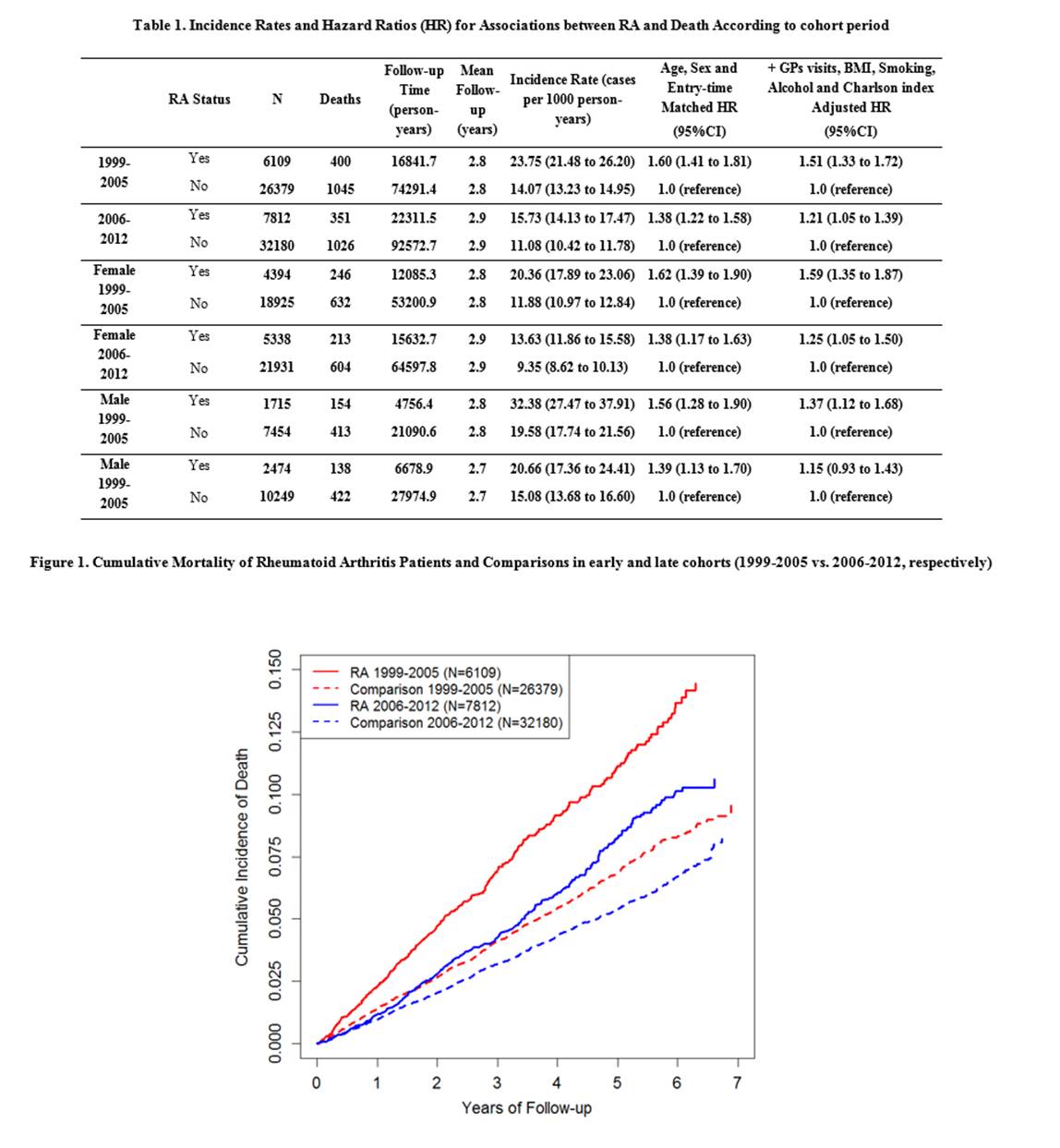Session Information
Session Type: ACR Concurrent Abstract Session
Session Time: 9:00AM-10:30AM
Background/Purpose:
All-cause mortality in UK has been decline by almost 20% over the past two
decades. While rheumatoid arthritis (RA) is associated with an increased risk
of mortality [1], it is unknown whether RA patients has experienced similar
trend of reduced mortality or even a greater reduction of mortality owing to
the improvement of clinical management of RA (e.g., biologics use since middle
of 2000’s). To address this knowledge gap, we evaluated mortality trends among
RA patients between January 1, 1999 and December 31, 2012 in a general
population context.
Methods: Using
The Health Improvement Network, an electronic medical record database
representative of the UK general population, we identified individuals with
incident cases of RA and up to 5 non-RA controls matched on sex, age, and year
of RA diagnosis, between 1999 and 2012 (i.e., ≥
1 year before the end of our dataset to allow for follow-up). The RA cohort was
then divided in two cohorts based on the year of RA diagnosis (i.e., 1999-2005
and 2006-2012) to evaluate changes in mortality. The follow-up time of early
cohort ended at the end of 2005 and late cohort ended at the end of 2012. We calculated hazard ratios for death using a
Cox-proportional hazards model and the rate differences using an additive hazard
model, adjusting for potential confounders (i.e., number of GP visits, body
mass index, smoking, alcohol and Charlson Comorbidity Index). We tested if the
effect of RA mortality varied according to time period by adding an interaction
term (i.e., RA*period) into regression model.
Results: Among
the early cohort (1999-2005) RA patients had considerably higher mortality
rates than the late cohort (2006-2012) (i.e., 23.8 vs. 15.7 cases per 1000
person-years), as compared with only a moderate improvement in the general
population between the two periods (14.1 vs. 11.1 cases per 1000 person-years).
The adjusted mortality rate differences between two comparison cohorts was 9.7
(95% CI, 7.2-12.2) cases per 1000 person-years in the early cohort and 4.7 (95%
CI, 2.9-6.4) cases per 1000 person-years in the late cohort (p for interaction
<0.01). The corresponding HRs for all-cause mortality were 1.51 (95% CI,
1.33-1.72) in the early cohort and 1.21 (95% CI, 1.05-1.39) in the late cohort,
respectively (p for interaction=0.027), suggesting that mortality reduction
over time is more apparent among RA patients than that in the general
population.
Conclusion: This
study shows that survival of RA patients has improved over the past decade,
suggesting that new treatments and improved management of complications and
associated comorbidities may be providing substantial benefits.
References: 1.
Annals of the Rheumatic Diseases 2014 Jan;73(1):149-153.
To cite this abstract in AMA style:
Lu N, Choi HK, Schoenfeld SR, Peloquin C, Dubreuil M, Rai SK, Avina-Zubieta JA, Zhang Y. Improved Survival in Rheumatoid Arthritis: A General Population-Based Study [abstract]. Arthritis Rheumatol. 2015; 67 (suppl 10). https://acrabstracts.org/abstract/improved-survival-in-rheumatoid-arthritis-a-general-population-based-study/. Accessed .« Back to 2015 ACR/ARHP Annual Meeting
ACR Meeting Abstracts - https://acrabstracts.org/abstract/improved-survival-in-rheumatoid-arthritis-a-general-population-based-study/

